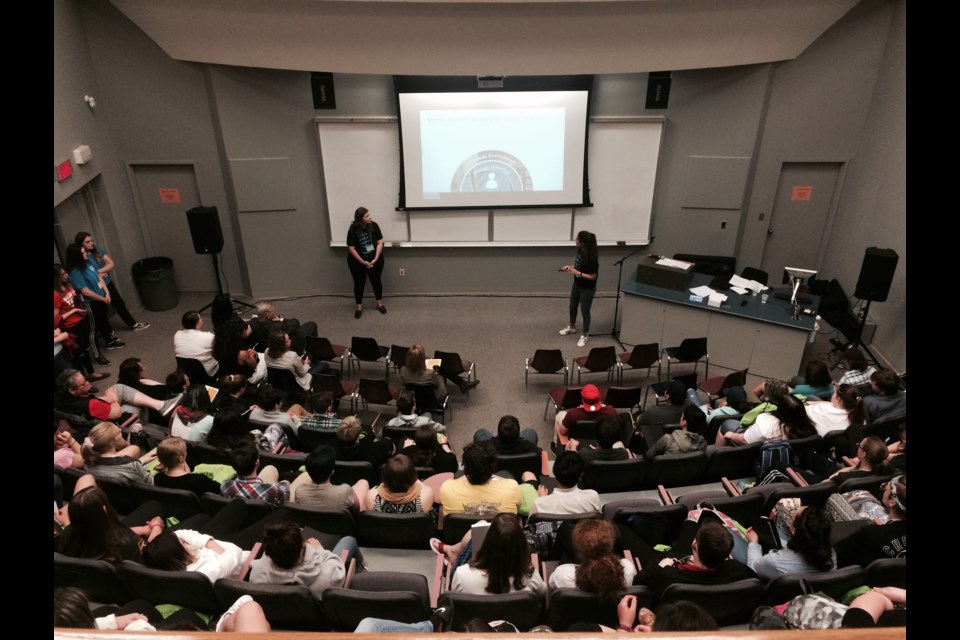Taylor Montgomery’s mental health journey began when she was quite young.
At first, she didn’t recognize the signs, silencing her own voice when it came to her struggles. It wasn’t until she went away to university, that her roommate expressed serious concerns over her behaviour, staying in bed all day, not going to class. Finally seeing the changes in herself, she reached out to a campus counselor, looking for help.
“At that point, I was diagnosed with anxiety, depression and OCD (obsessive-compulsive disorder). Luckily I was able to get the treatment I needed. Not every day is a great day, but most of them are really good. Without that friend discovering and showing concern, I honestly don’t know if I ever would have got the help that I needed,” said Montgomery.
“I was very resistant at first. I put that doubt and shame on myself. I was scared to be seen as weak and not able to handle it on my own. It did take me a few tries with a counselor to get on the right recovery track, but by persevering and having that right support system, the people who kept pushing me to those uncomfortable places is what got me where I am today.”
Montgomery works full time for Jack.org a national charity that works with youth across Canada to change the conversation around mental health. She along with and co-worker Stephanie Pietrantonio, were guest speakers at Be Well, a student-led conference for teens, focusing on mental health issues. It was organized by youth volunteers who work at the North Bay Parry Sound District Health Unit.
Pietrantonio is a Talks Coordinator for Jack.org.
“Youth know best what’s missing in their communities, so I’m really working to empower youth to give them the tools and the knowledge to go out into their communities and raise awareness and really get people talking about mental health, so they can address the different barriers that are in their communities,” said Pietrantonio.
“Within this age bracket, everyone says stigma is a huge issue. I think we’re starting to address that now, but I really think also the cultural sensitivity, breaking down the access to resources, there’s so many barriers that prevent people from reaching out. They just don’t know what supports are available, so it’s really ensuring that they know when they are struggling, what resources are available, and where to go.”
Katharine O’Connell, a community health promoter at the public health unit says it was the student volunteers who decided to organize a mental health conference because the issue is a priority for their age group. They planned activities and workshops along with community partners.
“Youth know their own needs. They can identify with other youth. They know what’s important to them so having a youth-led conference is very important. When you hear the messaging from someone your own age, it sometimes clicks and sets in a little bit more. I think it’s exciting for the young people who are here today to see that youth are capable of accomplishing anything when they put their mind to it.”
Approximately 90 secondary school students from grades 9 to 12 representing seven schools from North Bay and area, took part in the one day conference.
“I would love the biggest takeaway to be that youth recognize that mental health is important. It’s a part of our well-being. It’s a part of who we are. So I hope people recognize they need to take care of themselves. Mental health is very important. It needs to be treated just like physical health,” said O’Connell.
Youth volunteer, Jillian Picco from St. Joseph-Scollard Hall led a mental health and stigma workshop, explaining the difference between mental health and mental illness, and how youth can stop the stigma that comes with both.
“They can do that by knowing the difference between the two. It’s a huge issue in today’s society, especially with social media. For instance, always texting, which is terrible for mental health because it means we’re not doing other things we could be doing to take care of ourselves, like making sure we have a good balance in our lives,” said Picco.
“We need to do more. I think it’s something we can definitely work on and with everything we’re doing here today, I’m confident that it’s going to give people the skills to be more comfortable doing that.”
Montgomery’s advice is to watch for signs. If someone appears to be struggling, don’t be afraid to ask questions and voice any concerns.
“For the people who are struggling, get rid of any feelings of blame or weakness, because at the end of the day those things don’t matter because they’re not true. Persevere. It’s not going to be an easy road, but starting that journey is one of the best feelings I’ve ever had. That weight lifting off and knowing I was doing something was amazing. I did graduate, and now I’m working full time at Jack.org so I am fortunate enough to talk about this every day.”



